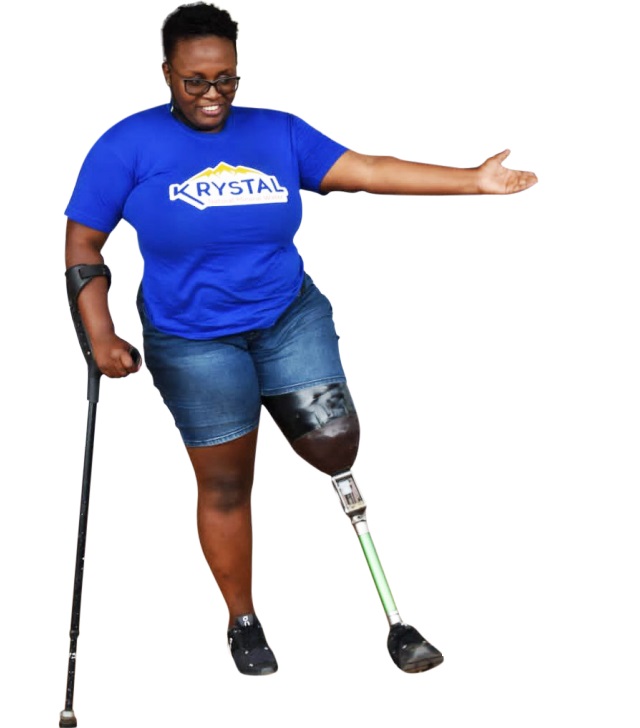
Finding a reason to live after losing a leg in car crash
Every day 10 people on average die in road traffic crashes in Uganda, which is the highest in East Africa, according to police and the United Nations Economic Commission for Africa’s Road Safety Performance Review report for Uganda published in 2018. The World Health Organisation puts the annual fatalities to over 10,000 people. Thousands more are left with life-changing injuries, some become destitute. Many of those involved in the crashes are young people whose lives and dreams are suddenly cut short. Charlotte Kangume is one such victim. She recently recounted her story to a group of journalists undergoing training on road safety reporting. The Independent’s Ronald Musoke captured her story.
Kangume, 28, is the co-founder of Amputee Self-Help Network-Uganda; an organisation that helps road crash victims to cope with the aftermath. She co-founded it in 2019 with Alex Munyambabazi, an amputee. They met in hospital where Kangume also had her leg amputated.
Most amputees in Uganda are because of road crashes, bodaboda and car crashes.
“It is so unfortunate that simple things are making us lose a leg or a life,” Kangume says.
She remembers the night of January 26, 2018 like it just happened yesterday. “We were coming from a graduation party and were dropping a friend to her house. We were drunk,” Kangume says.
Her friend’s neighbourhood had a narrow road which was flanked by a storm water channel. So as the driver tried to manoeuver and turn around the car after Kangume’s friend had reached her home, one of the car’s tyres got stuck in the trench.
That marked the genesis of Kangume’s troubles.
Even when they were all drunk and tired, they tried to push the car out of the trench with little success. Kangume soon gave up the task and decided to lean against a wall fence— metres away from the scene.
Soon, a man from the neighbourhood came around to help. He got into the driver’s seat and tried to steer the car out of the trench but suddenly accelerated and the car jerked forward and crashed Kangume’s lower body damaging her left leg.
“My friends were all intoxicated and only one of them was sober and could help me go to hospital to receive first aid,” she says.
At first it was thought she would be treated and go back home.
“They had just put plates in the knee because they thought I had just got a simple fracture. Life was moving on well and I was even being oriented to walk on crutches,” she says.
But then the injured leg started turning black.The doctor had not noticed immediately that a vein in the back calf area of the leg had been damaged. She was told she had suffered internal bleeding which also caused gangrene. The medics said they were going to try all they could but could not promise that Kangume would not lose her leg. She was eventually told her leg would be amputated.
“When the doctors told me I was going to lose my leg, it was devastation, not only for me but also for my family,” she says.
She says, at first, everyone was against the medical advice.
“I was heartbroken. I did not know how life was going to be for me after the leg is amputated. I am a very social being; I love working; I love going places and adventure. I always want to stand out and I want to be a different girl. So when they told me that, I first prayed.”
“I want to be honest, I had the faith that God would make a last minute change in the theatre because my friends were always in hospital praying with me. I told God that I know I have been a crazy girl but if it is not for me, do it for these people that trust you to make a difference in my life.”
The miracle Kangume expected never came. So she prepared for the surgery. “I told my mother that I wanted to do research about the life of an amputee more so for a girl like me. I also told my friends to get contacts of any amputee they met on the streets of Kampala.”
She says she wanted to talk to anyone so she could get an idea of what she was getting into. She also did the internet research and saw that the amputees were actually going on with their lives.
“I realised that the world has changed so rapidly. She discovered “cool prosthetic limbs” that one could live their lives normally.”
So, off to the theatre, she went. Sadly, her trauma almost began instantly. First, there was a power outage during the operation. She saw doctors panicking.
“They were using ventilator lights and portable equipment to carry on with the surgery. It is so amazing that the operation was successful,” she says, “It is by God’s grace that I did not lose both legs or get paralyzed from the waist downwards.”
But Kangume would face up to more reality after the surgery.
The post Amputee Self-Help Network-Uganda appeared first on The Independent Uganda:.
from The Independent Uganda: https://ift.tt/3FzxQoI
0 Comments